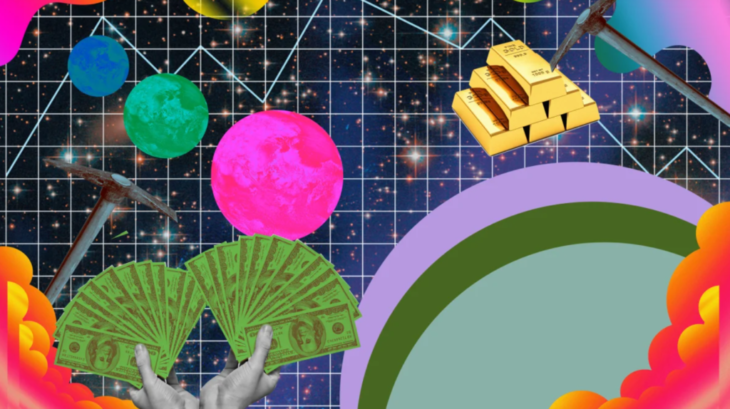‘The Mine as Transnational Infrastructure’ // Planetary Mine

´An illustration showing US hundred dollar bills, gold, and space´ – Illustration by Chrissie Abbot
Reflection for Collaborative Context \\ Rachael Verdugo
Professor: Alex Hadley
Landscapes of extraction, puncturing and feeding into the core of our ecosystems. Acceleration, robotisation, automation, social production and struggle. The fourth industrial revolution ‘has so far been unrevolutionary’.
Ethical conditions for workers in the mining sector have been on the brink for centuries, and with technological advancements even more so. Nelson Quichillao, a mining worker of more than fifteen years saw the bloodshed directly, which ended in his life in a raging battle of police brutality. 300 subcontracted workers were pointed at with infrared beams in a fight for better conditions, a stable work contract, health insurance among other fundamental benefits which come under Chile’s labour regulations.
The shift towards intelligent machines has emerged from the acceleration of the automation industry and the fabrication of machines by machines has led to a disequilibrium of conditions for living labour. We are beginning to ‘witness a new stage in the historical struggle of capital against labour… a new generalised architecture of social production’. The growth of the mining industry has made direct strides due to big data, geospatial information systems, robotics and innovations in artificial intelligence, making operation time twenty-four hours a day, seven days a week. This organisational and technological modernisation affects ‘fabrics of human and nonhuman existence’ and leads to the creation of ‘casino capitalism’. The ‘impermanence of things and the contingent nature of reality’.
The unification or rather fusion of these technologies and the interplay between the digital, physical and biological domains distinguishes this revolution from previous. Although despite these advancements, in large scale extraction sites more solid waste is produced than those working with older technologies. It should thus be put into question whether or not these advancements are in fact progressive, ethical and feasible.
“‘The Reflection of The Mine as Transnational Infrastructure’ // Planetary Mine Reflection” is a project of IAAC, Institute for Advanced Architecture of Catalonia, developed at Masters in Advanced Ecological Buildings and Biocities in 2021-22 by Rachael Verdugo
Faculty: Alex Hadley